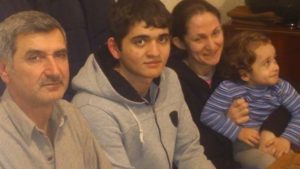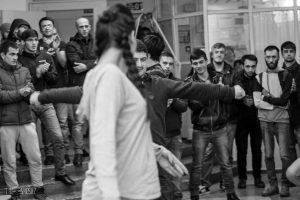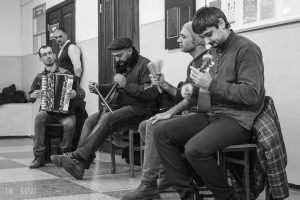

 There are more than 1,200 Syrian Circassians living in Kabardino-Balkaria. They came to their historical homeland to escape the horrors of war, but integrating into the local community is not easy.
There are more than 1,200 Syrian Circassians living in Kabardino-Balkaria. They came to their historical homeland to escape the horrors of war, but integrating into the local community is not easy.
Nart Ismail knows several languages. He used to construct royal palaces and churches, but he is unable to find work in Kabardino-Balkaria. He and his family fled from Syria to Russia in 2012. Since then, Nart and his wife Dina have been unable to obtain Russian citizenship, which has greatly hampered their chances of finding employment.
Kabardians live compactly in Kabardino-Balkaria. They are considered to be the largest group of a broader Circassian ethnic group. Many Syrian Circassians are descendants of muhajirs (from the Arabic hijra, meaning ‘relocation or escape’), migrants from the Caucasus who were forced to flee their homeland to the Middle East during the conquest of the central and northwest Caucasus by the Russian Empire in the 19th century. Many are now seeking asylum in Kabardino-Balkaria, what they consider to be the birthplace of their ancestors. Nart and Dina are among them.
Less than 5 percent of refugees have received Russian citizenship
Only 68 Circassian refugees have obtained Russian citizenship, as of 1 October 2016, which is less than 5 percent of the total applicants, according to the Russian Migration Office in Kabardino-Balkaria. The rest are either staying in the republic on either a temporary (371 people) or permanent (619 people) residence permit. Temporary asylum has been granted to 38 people.
In addition, as the conflict in Syria has escalated, 111 Circassians who were already Russian citizens but lived and worked primarily in the Middle East have returned to Kabardino-Balkaria.
Some of the Syrian Circassians have settled in rural areas of the Baksan, Chegem, Leskensky, Zolsky and Terek districts of the republic. These are mainly people who are accustomed to rural life and in their homeland — Syria — were engaged in agriculture and animal husbandry. Most of them have been provided with land and housing. One unnamed sponsor purchased 90 houses equipped with water, gas and electricity for some of the larger and poorer families.
Others live in Nalchik, some in flats, which are rented either by the same sponsor or from their own funds, and others in the city’s Terek and Elbrus sanatoriums and health resorts.

The long road to the land of their ancestors
‘I was born in Quneitra muhafaza (a province in the south-west of Syria) in 1964’, Nart says ‘Back then it included the Golan Heights, where the majority of the Circassian diaspora in Syria lived. Golan was occupied by Israel after the two wars, in 1967 and 1974, and the Circassians living in this part of the country were forced to leave their villages and move further out to the east.’
In the mid-1970s part of the occupied province of Quneitra came under the control of UN forces and was demilitarised, but the Syrian government did not allow the refugees to return to their homes in this area.
After 1974 Nart’s family settled in the small village of Beer Ajam and continued to farm. Nart graduated from school and went to Damascus, where he enrolled in the University of Damascus’ Faculty of Economics and Banking. After some time, Nart left his studies and moved to Jordan, where he entered Amman University intending to specialise in programming.
‘I met with a relative in Amman who owned a small firm engaged in construction and design’, Nart says. ‘He offered that we work together. At first all was well. The firm had many clients and we were earning a decent amount. In short, life became normal, and I got married. We came back to Nalchik, my parents and I, in 1991, to look around and check prices. But Russia had huge problems in the early 1990s — unemployment, banditry, corruption, a total deficit of everything — and my parents, who had wanted to stay in Nalchik and live there, changed their minds.’
When he came back to Syria Nart worked on the construction of the King of Jordan’s residence, Ragadan, and on the construction of villas for Syrian President Assad’s family. He has also worked in Germany, where he designed private houses, and in the US, where he renovated a church in Detroit.
‘But the happy times were soon over’, he says. ‘There was unrest in the governorates of Hama, Homs and other places, militants of the Islamic State appeared in Quneitra. They killed government officials, and organised terrorist acts, inciting the population to revolt against the government. Local authorities were unable to protect their own citizens.’
Nart and his family fled Beer Ajam in 2012 for Damascus, but he couldn’t find a job in his profession in the capital. The war was raging everywhere, and it crept to the outskirts of the Syrian capital too. After some deliberations, Nart and Dina decided to go to the Caucasus, the homeland of their ancestors. They packed their possessions, bought an exorbitantly priced ticket, and flew to Russia via Istanbul.
‘Our expectations were too high’
‘I had hoped I would find a job quickly and would start working’, Nart says, ‘But our expectations turned out to be too high. However, we did not despair and hoped for positive changes, thanks to the guys from the Peryt organisation (meaning ‘counselor’ in Circassian), who helped us with our registration of documents.’
Peryt has since stopped its activities for unknown reasons. Another organisation, Zhegu (‘hearth’), now assists refugees from Syria. Nart hopes that the organisation will succeed in doing what its predecessor failed to do.
Nart Ismail now lives with Dina and their two children — 15-year-old Nabil and 5-year-old Ruslan — in one of the old buildings of the Terek sanatorium, which has been transformed into a family dormitory. There are 17 more families of Circassian refugees living there. Ismail’s family’s accommodation consists of one small room and a two sq metre hallway, which acts as a kitchen. In Kabardino-Balkaria, Nart introduces himself under his Circassian surname, Pshibi. In the Middle East, almost all Circassians have Arab names, adopted to avoid standing out.
Dina, who is a sanitary engineer by trade, still hopes to improve her family’s financial situation.
‘I hope I will find a job after our youngest boy gets older’, she says. ‘Here in Nalchik there are several ateliers tailoring national dresses, and I think I can be useful to them. A woman usually performs the duties of a housewife in Syria, while men earn money, but I am ready to work just like the majority of local women. The problem is that I need a Russian passport to get a permanent job.’
On the question of why it is taking so long to get a Russian passport, Nart shrugs and says that they are willing to wait, because they have no other choice. In addition to his main profession as a designer, Nart is fluent not only in Arabic and Circassian, but also in English and French.
‘Shortly before the war I studied Turkish, as I had quite a good offer in Turkey’, he laughs, ‘but the war has undone these plans. I am now finishing the decoration of an estate belonging to one wealthy man with a group of local workers. I earn some money, but mainly it goes for food and clothing.’
Dina cannot work yet, as she is taking care of their youngest boy. Their older son studies at the 8th Urban School in the 10th grade.
‘He hasn’t taken any special lessons in Russian language’, Dina says, ‘But children easily adapt to a new language environment, and in the few years that we have lived here, Nabil has mastered Russian and improved his Adyghe quite a bit. The question now is — what will he do after he graduates from school? I discuss this with Nart all the time.’

‘This problem does not exist’
We spoke with Zaur Zhemukhov, a representative of the organisation Zhegu, about the problem Syrian Circassians have with obtaining Russian citizenship, which they need to move to Kabardino-Balkaria and other North Caucasian republics.
When we asked about the reasons for the delays in issuing Russian passports, he said that it cannot be explained by either the local or central authorities.
‘Even those, who have lived in Kabardino-Balkaria for several years, cannot obtain citizenship’, Mr Zhemukhov says. ‘And so they cannot get a permanent job. I appealed to the MP of the State Duma from the United Russia party on the issue of reception and accommodation of Circassian refugees, our fellow Adalbi Shkhagoshev. He responded that he wasn’t familiar with the problem of Circassian refugees, while representatives of the Migration Office respond to our appeals with — ‘this is false information.’”
Mr Zhemukhov says that members of Zhegu have the impression that no one in the government takes this problem seriously, although this applies more to the the State Duma and the Parliament of Kabardino-Balkaria than to the Migration Office.
‘A few years ago, issues with granting asylum and nationality to foreign Circassians were successfully solved by Albert Kazharov, a Senator from Kabardino-Balkaria in the Russian Federation Council’, Zhemuhov says. ‘However today, nobody lobbies these issues anymore’, he adds.
‘When someone asks the government what they are doing for the reception, accommodation and adaptation of Circassian refugees, they usually begin to list the measures taken by social activists.’
It is the same, when it comes to the sponsorship of refugees, with the authorities taking credit for this as well, Zhemuhov says.
‘It is not surprising that all, without exception, private benefactors and sponsors ask the media not to publish their names. We hope that the problems of Circassian refugees will be officially recognised, and that government bodies will be engaged in resolving them.’
There are a number of possible explanations for the Russian government’s inactivity. Certain influential voices in Russia do not want see an increase in the indigenous population of the region, which is already set to exceed the number of non-indigenous inhabitants in the south of the country. Russian intelligence services also tend to see radical religious or nationalist views in all Circassian immigrants from the Middle East.
And yet, it is impossible to say that the authorities do absolutely nothing for the refugees. Mr Zhemukhov says that many immigrants are allocated allowances and the right to free medical care, but this is does far too little to help them in their current conditions.








